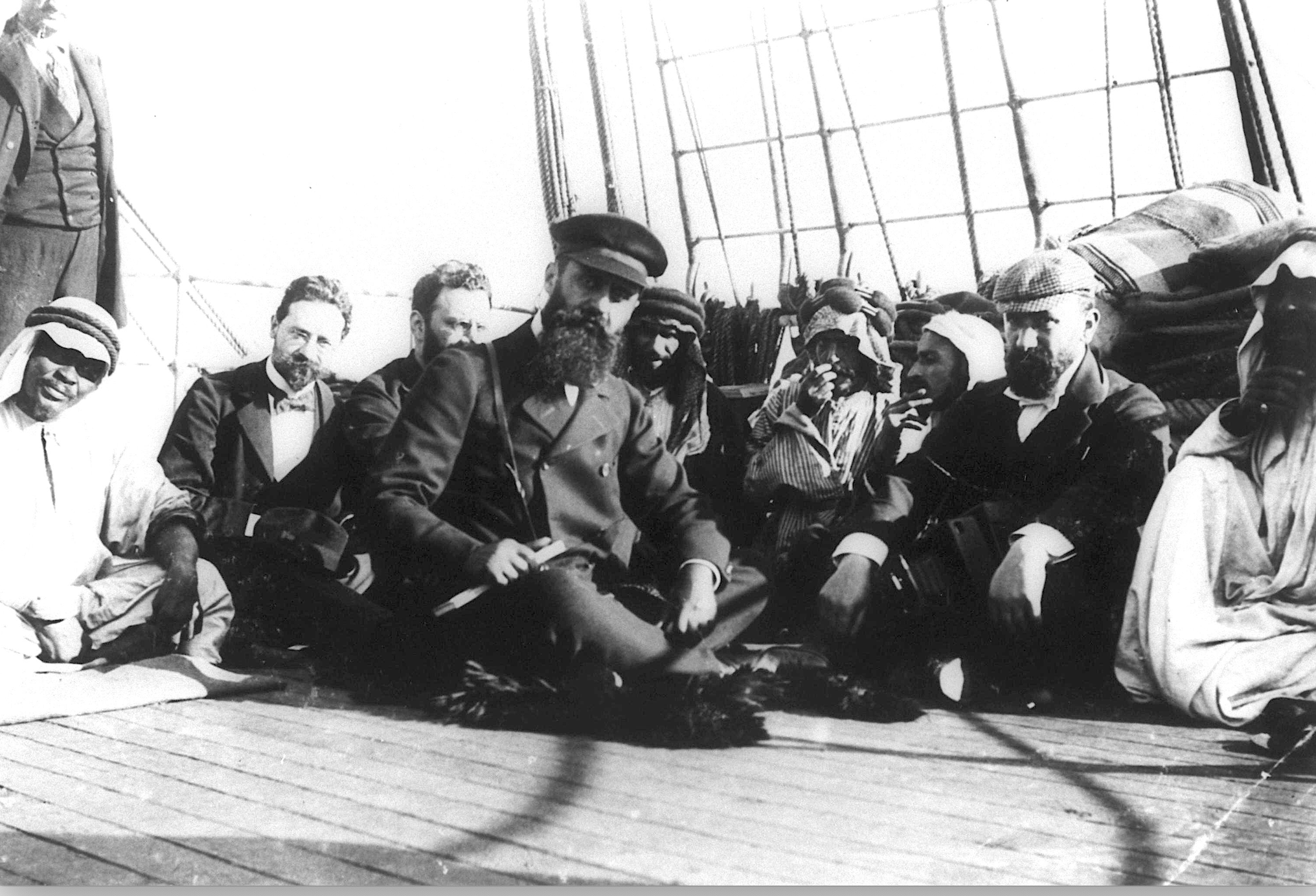Since the beginning of the Zionist settler colonial project, writes Fathi Nimer, Palestinians have been continuously expected to accept peace offers that deny their sovereignty.

Theodor Herzl en route to Palestine aboard a ship in 1898. (National Photo Collection of Israel, Wikimedia Commons, Public domain)
By Fathi Nimer
Al-Shabaka
 Since the beginning of the Zionist project in Palestine, large efforts have been exerted to paint all resistance to its colonial endeavors as irrational and at odds with progress and modernity.
Since the beginning of the Zionist project in Palestine, large efforts have been exerted to paint all resistance to its colonial endeavors as irrational and at odds with progress and modernity.
From the onset, Theodor Herzl, founder of political Zionism, envisioned that local Palestinian Arabs would welcome the progress brought by Zionist colonizers and greet them with open arms. Those who did not, or the “penniless” ones who could not contribute to this new society, would be “spirited” across the border.
Contrary to Herzl’s predictions, the Zionist colonial project was largely met with resistance. Rather than understanding this for what it was — the natural response of indigenous people toward colonialism — the majority of Zionist leaders dismissed this opposition as regressive and rooted in a fear of ingenuity and prosperity.
Later, Palestinian resistance would be characterized by charges of anti-Semitism and senseless bloodlust.
This deliberately manufactured dichotomy between the prosperous and civilized Settler and the regressive and rejectionist Arab standing in the way of progress set the tone for developments between Palestinians and Zionist settlers for decades to come.
Rejectionism During the Mandate Period

Arab demonstrators in Jaffa advancing toward the police force in the square, October 1933. (Library of Congress, Public domain)
During the Mandate for Palestine, the British government followed an openly pro-Zionist policy that privileged the new Jewish settlers and bestowed on them perks and preferential treatment that guaranteed their dominance and prosperity over the Palestinian Arabs.
Such benefits were not only economic, but also embedded Zionists and those sympathetic to them in positions of power, equipping them with the necessary tools to take control following the mandate’s conclusion.
That Palestinians had an inalienable right to sovereignty had no bearing on British plans for Palestine. This was articulated in the Balfour Declaration, which promised British government support in establishing a Jewish national home in Palestine.
While the declaration also promised not to “prejudice” the rights of the existing “non-Jewish” population, the wording made clear that the indigenous community would simply be an afterthought, denying their very identity as Palestinians.
Unsurprisingly, Palestinians wholeheartedly opposed this declaration, which saw an imperial power promise their land to another people. The declaration sparked protests that continue to this day on the anniversary of its issuance.
In a notable feat of historical revisionism, Israeli leadership uses Palestinian opposition to the Balfour declaration as one of the first examples of Palestinian rejection of coexistence and rights for all.
“In a notable feat of historical revisionism, Israeli leadership uses Palestinian opposition to the Balfour declaration as one of the first examples of Palestinian rejection of coexistence and rights for all.”
Importantly, Palestinian grievances were reflected in British reports and investigations at the time. For example, the 1921 Haycraft Commission of Inquiry dismissed the idea that anti-Semitism was the driving force behind Arab resistance to the new settlers, instead pointing to the very real threat of Zionist takeover of Palestine as the basis for their reactions.
Nonetheless, the legitimate grievances of Palestinians highlighted in this and other subsequent reports were largely ignored, with the prevailing narrative claiming that Palestinian rejectionism was the main obstacle in finding a solution between the Arabs and the Jews.
Meanwhile, as Zionist influence and power expanded in Palestine, the calls to ethnically cleanse the natives grew louder, and multiple proposals were laid out on how to achieve this.
For example, the 1937 Peel Commission, which was instigated following the Great Palestinian Revolt, suggested the partitioning of Palestine and the forced transfer of 125,000 Palestinian Arabs to barren lands in order to make room for a Jewish state.
This proposal was overwhelmingly rejected by Palestinians, who understood that their right to self-determination over a large part of their land was being stripped away and given to a European settler population.

Jerusalem on May 8, 1945, Victory in Europe, VE Day. (Matson Photo Service, U.S. Library of Congress, Wikimedia Commons, Public domain)
Notably, it was also rejected by large parts of the Zionist community, who felt the proposed Jewish state was too small. In fact, Jewish settlers also rejected offers for a unitary state for all peoples between the Jordan River and Mediterranean Sea in both 1928 and 1947.
Decades of propaganda and selective reporting regarding the nature of these various plans during the British Mandate period have distilled into the trope of the unreasonable and rejectionist Palestinians, contrasted with their Zionist counterparts, who are historically positioned as willing partners in peace and compromise.
It is this history that gives weight to the racist saying, “The Arabs never miss an opportunity to miss an opportunity,” which has since become ingrained as a cornerstone of Western analysis on Palestine.
Rejectionism During the Peace Process
This framing would come to dominate the modus operandi for how the international community dealt with Palestinians during the peace process years, when a plethora of conferences and peace talks were held under the guise of finding a lasting solution.
In reality, these efforts were always, first and foremost, about securing Israeli interests without concern for Palestinian rights. Regardless of how egregious the demands from Israel were during these negotiation efforts — such as including proposals for inequitable land swaps — Palestinian challenges were continuously painted as outright rejections to peace.
This narrative was particularly prevalent during the 2000 Camp David negotiations, where the trope was widely employed by the U.S. government and media in an attempt to bully Palestinians into accepting nominal self-autonomy in place of a sovereign state.

U.S. President Bill Clinton, center, with Israeli Prime Minister Ehud Barak on left, the Palestinian Authority’s Yasser Arafat on right at Camp David, July 1, 2000. (White House Photograph Office, Clinton Administration, Wikimedia Commons, Public domain)
The supposedly generous offer that Palestinians rejected during the negotiation process was in fact a quasi-state that would have no control over its borders and no sovereignty over its capital, airspace, or natural resources.
Additionally, vast swathes of land were to be annexed, dissecting the West Bank into non-contiguous cantons, with a permanent Israeli military presence.
The rights of Palestinian refugees were entirely sidelined, and Israel would hold the authority to invade the West Bank at any time it desired. The proposal was so dismal and unjust that even then-Israeli Minister of Foreign Affairs Shlomo Ben-Ami later admitted that he would have rejected it had he been Palestinian.
Despite this, the Palestine Liberation Organization (PLO) was willing to concede and accommodate the majority of the demands, as unpopular as they were with the Palestinian grassroots.
Indeed, the PLO’s counterproposal gave up nearly 80 percent of Palestine by accepting 1967 borders; authorized the presence of U.S. or international peacekeepers in the Palestinian state; yielded on the right of return for virtually all refugees; and gave up control over large swathes of East Jerusalem.
Still, even with the PLO’s willingness to surrender critical rights and sovereignty, negotiations ultimately failed as Israel’s list of demands relentlessly expanded.
As expected, Palestinian reluctance to accept the ever-increasing demands of Israeli leadership — particularly regarding sovereignty over East Jerusalem and its holy sites, as well as the final borders of the Palestinian state — was added to the growing pile of their supposed “missed opportunities.”
Indeed, the myth of Palestinian intransigence was weaponized and used to argue that Palestinians could not be reasoned with, and that peace would continue to be rejected no matter how generous their settler counterparts were.
This argument has been used as a pretext to Israel’s indefinite military occupation of the West Bank and Gaza.
“The myth of Palestinian intransigence was weaponized and used to argue that Palestinians could not be reasoned with, and that peace would continue to be rejected no matter how generous their settler counterparts were.”
Of course, the same standard has not historically been applied when Palestinians have made negotiation offers or counter proposals that are then rejected by the Israeli regime.
As was the case in 1928, 1948 and 2000, among other instances, then-Israeli Prime Minister Ehud Olmert rejected yet another counteroffer in 2008 made by Palestinian negotiators, who pushed for 1:1 swaps of West Bank territory with land of equal quality within the Green Line.
Olmert had also previously refused the very concept of sharing control of Palestinian holy sites in Jerusalem, despite the protection of Palestinian sovereignty over the sites under international law. After replacing Olmert in 2009, Benjamin Netanyahu refused to continue the ongoing negotiations process and insisted on starting from a new hard-right baseline.
In the decades that have followed the peace process era, blame for the demise of the two-state solution continues to be placed squarely on the Palestinians for failing to be “partners in peace.” This is regardless of the Israeli regime’s continued annexation campaign across the West Bank and successive Israeli prime ministers promising to thwart the creation of a Palestinian state under their tenure.
Rejectionism After Oct 7

Israeli military during ground invasion of the Gaza Strip on Oct. 31, 2023. (IDF Spokesperson’s Unit, Wikimedia Commons, CC BY-SA 3.0)
In the wake of Oct. 7 and the ensuing Israeli genocide in Gaza, the international community is grappling with the reality that it cannot “shrink the conflict” indefinitely. Long-dormant speeches about the two-state solution have been resurrected, accompanied by a stream of patronizing analysis that blames Palestinian rejectionism for the current status quo.
The swift and widespread deployment of this trope immediately following Oct. was remarkable, as if in lockstep a deluge of pundits joined in the chorus to regurgitate the same talking points from decades past.
For example, in an op-ed for the Times of Israel, Deputy National Director of the Anti-Defamation League Kenneth Jacobson stated that “the ideology of Palestinian rejectionism, which has only disdain for Israel and the Jewish people, is at the root of this extremism.”
The Spectator, a British newspaper, published a piece that claimed: “Seven wasted decades should be more than enough but many of the incentives in Palestinian politics and civil society remain geared towards extremism and rejectionism.”
Additionally, a piece published in the Jewish News Syndicate (JNS) compared Palestinians to a “troublesome child” that should not be rewarded for “terrorizing” its parents. The JNS likewise issued a piece that pushed the all-too-familiar myth that “Ehud Barak offered Arafat everything he claimed he wanted.”
While the content of Barak’s offer was never spelled out, the crux of the argument remains that Palestinians cannot be reasoned with.
It is important to underscore the dangerous message that policymakers and analysts alike are advancing here: By repeatedly peddling the false connection between the myth of Palestinian rejectionism, the rise of “extremism,” and the current assault on Gaza, blame is implicitly—or at times, explicitly—placed on Palestinians themselves for the genocide being waged against them.
“By repeatedly peddling the false connection between the myth of Palestinian rejectionism, the rise of ‘extremism,’ and the current assault on Gaza, blame is implicitly placed on Palestinians themselves for the genocide being waged.”
We see a similar utilization of this trope during the coverage of negotiations with Hamas concerning a ceasefire and the possibility of a prisoner exchange. Despite Hamas signaling from early on in the war that it was open to negotiation and the release of hostages in exchange for prisoners, Israeli Prime Minister Benjamin Netanyahu was adamantly against the idea.
Still, whenever Israeli leaders reject a proposal by Hamas, they are framed as rational, making the decision due to a proposal’s unacceptable terms and threats to Israeli security and interests. When Hamas members reject Israeli proposals for failing to ensure a lasting ceasefire, their decision is positioned as a rejection of peace and desire to prolong the war, informed by ingrained bloodlust and anti-Semitism.
Since the beginning of the Zionist settler colonial project, Palestinians have rarely been treated like rational actors. Rather, they are continuously expected to fall in line with U.S. and Israeli interests and accept offers that deny their sovereignty and inalienable rights.
This is part of a larger anti-Palestinian framework, which relies on the creation and proliferation of racist and dehumanizing tropes to legitimize and advance Zionist settler colonialism.
This framework feeds into an immense asymmetry of power that is wielded by the West to impose a solution on Palestinians, regardless of what it means for their rights and political aspirations.
Versions of this resolution have changed over the years, but they hold in common the primary concern of assuaging Israeli demographic and security anxieties without heed to Palestinian lives or dignity. This has resulted in dozens of proposals that amount to aesthetic or nominal reformulations of limited autonomy and continued occupation.
Ultimately, the very premise of compromising with colonizers and their settler colonial goals is unjust — and, as history shows, futile. However, even when Arabs and Palestinians have signaled a willingness to accept a certain level of injustice for the sake of resolution, it has been deemed insufficient.
What is evident, then, is that the issues at hand have never been about details or parameters of dialogue, but rather about extinguishing resistance and Palestinian identity as a whole.
No matter how many rounds of negotiation commence, nor how many Palestinian rights are ceded, the Israeli regime will never be satisfied. Indeed, it is impossible to appease settler colonial systems through compromise when their only goal is indigenous erasure.
Fathi Nimer is Al-Shabaka’s Palestine policy fellow. He previously worked as a research associate with the Arab World for Research and Development, a teaching fellow at Birzeit University, and a program officer with the Ramallah Center for Human Rights Studies. Fathi holds a master’s degree in political science from Heidelberg University and is the co-founder of DecolonizePalestine.com, a knowledge repository for the Palestinian question.
This article is from Al-Shabaka.
The views expressed are solely those of the author and may or may not reflect those of Consortium News.
Please Donate to the
Spring Fund Drive!



Could it mentally be feasible to transition into the 21st century…leaving behind all that ‘once upon a time’? Palestinians have suffered enough, back stabbed by their Arab brethren, and looked down upon by WHITE Anglo/Saxon societies who only think of themselves as the creme de la creme of white societies. Live and let live…
“Ultimately, the very premise of compromising with colonizers and their settler colonial goals is unjust — and, as history shows, futile.”
The whole world is being forced to consider this truthful statement. The US and its vassals, including Israel cannot be trusted to negotiate in good faith. Peace and Justice are not on the agenda. Total domination is the goal. What is termed progress is in fact total annihilation of resistance to extermination in the name of profits for the global bankers. We had better figure this scenario out real quick before they succeed in forcing global servitude to a tiny psychopathic ruling cabal.
I think the author is too kind to the Balfour Declaration, insofar as, it doesn’t actually promise “not to ‘prejudice’ the rights of the non-Jewish population.” What it actually says is far less, “…nothing shall be done which may prejudice the civil and religious rights of existing non-Jewish communities in Palestine…”Note that the only rights mentioned are civil, and religious rights, with no mention of political, economic, and self-determination. So the Palestinians were always seen as subordinate to the Jewish populace who were promised the land as a national homeland. There can be no doubt that Lord Balfour was aware of the distinction between these sorts of rights, because the declaration goes on to say that it will “not infringe the rights and political status of Jews in any other country.”
The Palestinians are, as Bob once said, “only a pawn in their game.” One can also wonder how all encompassing the role of pawn is in this particular game, given the long-standing role of Christian Zionism, begun in the 16th Century, way prior to political Zionism. Just who is using whom? And when the wheels fall off this project, who is most likely to be thrown under the bus?
Just bog standard Zionist Victim Blaming.
British Mandate colonial rule was extremely brutal and repressive.
100,000 troops and police were sent to pre war Palestine ( a ratio of one to every 4 Palestinian adult males) to brutally suppress all Palestinian organisations in favour of Zionist usurpers.
Religious nutjobs like Wingate set up and trained Jew terror gangs who were given free rein to murder Palestinians.
Palestine was promised to the Jews to buy the support of US Jewish bankers during WW1.
Britain, and later the US, have never been anything remotely approaching honest brokers.
So we are where we are.
One of a number of similar intractable situations that have been just allowed to fester over the decades, at greater and greater cost to Israel’s various sugar daddies, ever increasing financial, military, political and diplomatic costs, with no end in sight. The end result quite conceivably global nuclear war.
All based on the false premise that indigenous people can be subjected to an alien settler regime that denies them any vestige of political rights or even human dignity.
Have you ever interacted with someone diagnosed as narcissistic.
This is exactly how they behave. Any concessions or compromise is a win, which means they deserve more because they won.
Impossible to rationalize with them
I think it may have been in one of Shlomo Sand’s ‘Invention’ books, where he traced the rise of a ‘homeland for Jewish people’ to the UK during the latter half of the 1800s.
An influx of Jews from eastern Europe, due to pogroms, saw refugees flee west, including into Britain.
One of the UK elite, eager to drive Jews out of Britain, conjured the notion of a ‘Jewish homeland’ and sold it to the refugees.
And it was swallowed, and developed.
During the early days there was no specific location advocated: Africa, Australia, Sth America …
Balfour is only one of the culprits.
Apologies I am so scant on detail; the Sand book is currently in storage.
That was probably “The Invention of the Land of Israel.” I don’t recall if it said this, or not, but I have learned that Christian Zionism pre-dates political Zionism by about four hundred years! All the way back to those bad-boys, the Puritans, and we all know where they ended up.
thanks Joy